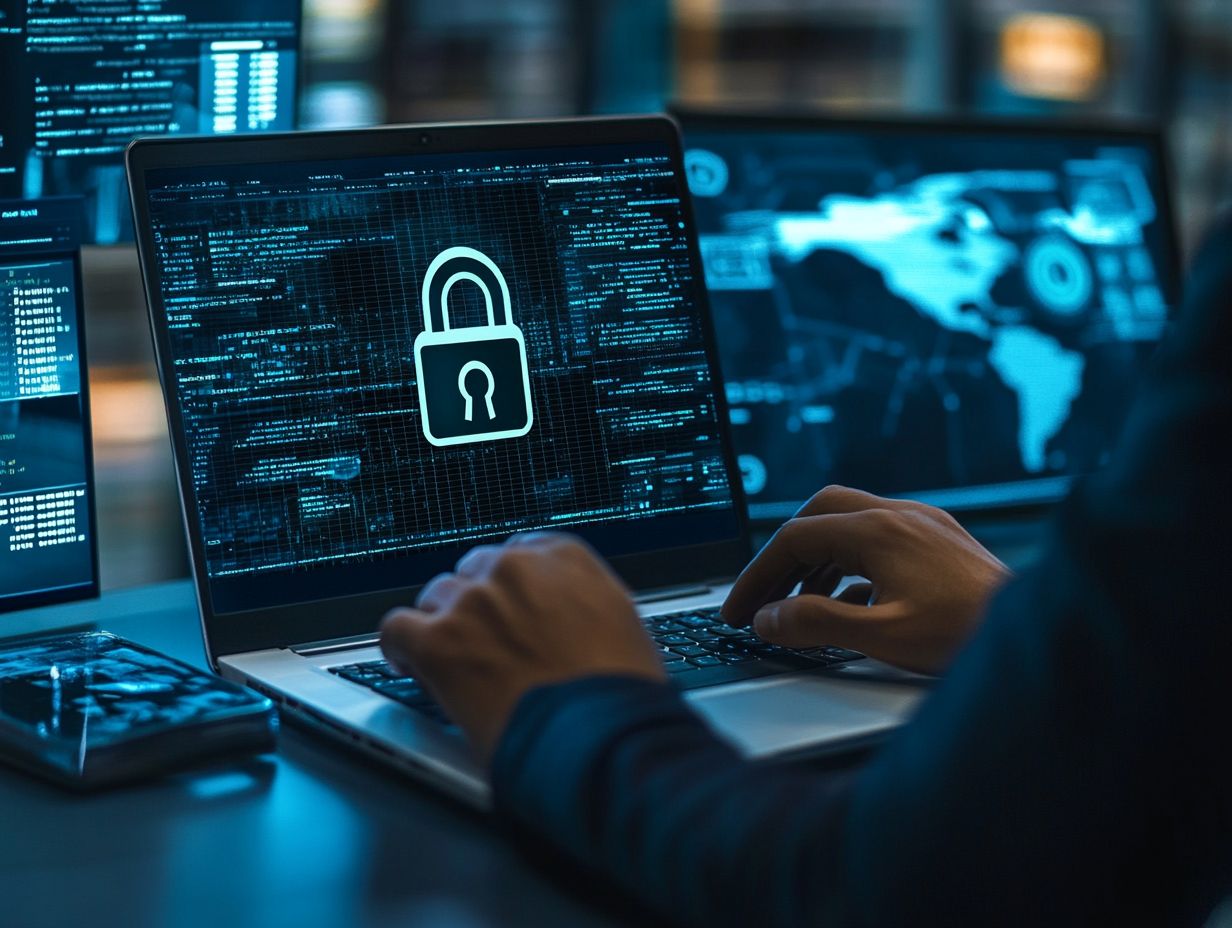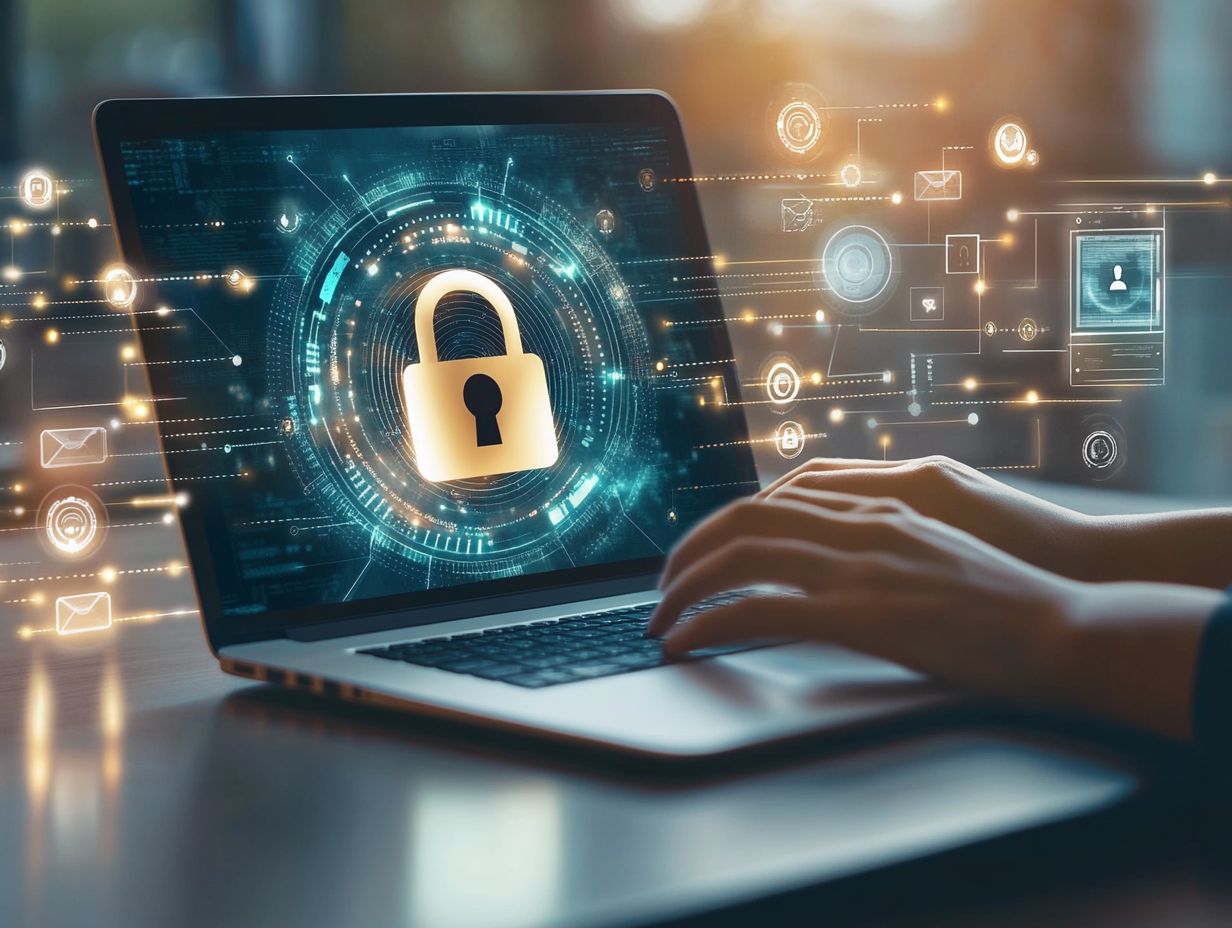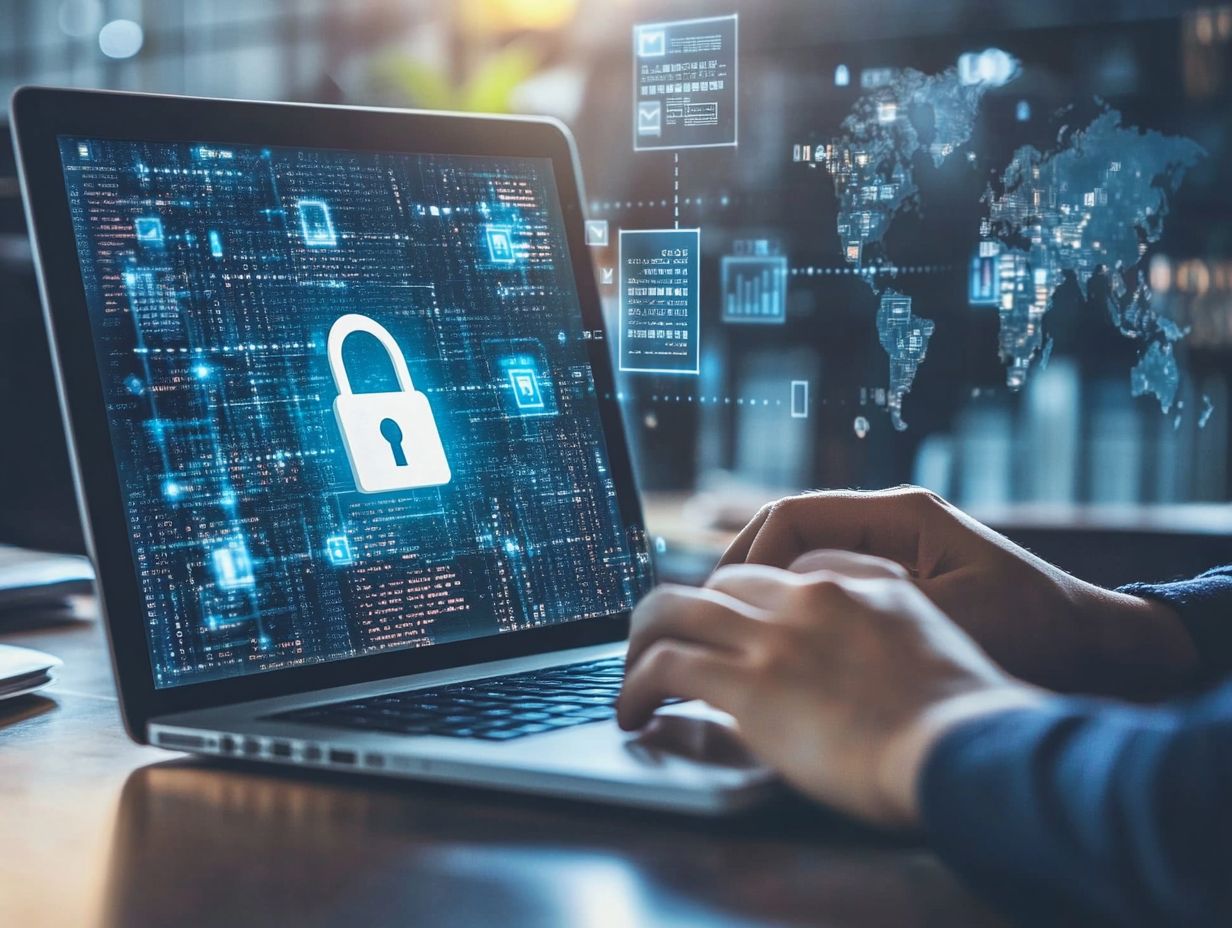How to Defend Against Cyber Crimes
Cyber crimes are a significant threat to individuals and businesses today. From identity theft to financial fraud, understanding different types of cyber attacks is crucial for keeping your information safe.
This article covers the impacts of cyber crimes and common types you might encounter. You’ll also learn effective prevention strategies and what to do after an attack.
Arm yourself with the knowledge to navigate this complex issue and protect what matters most to you.
Contents
- Key Takeaways:
- Understanding Cyber Crimes
- Types of Cyber Crimes
- Preventing Cyber Crimes
- Responding to Cyber Attacks
- Legal Actions Against Cyber Crimes
- Frequently Asked Questions
- How can I protect my personal information from being stolen in a cyber attack?
- What should I do if I suspect my computer has been infected with malware?
- What are some signs that my device may have been compromised?
- Is it important to keep my software and operating system up to date?
- What should I do if I fall victim to a cyber crime?
- How can I educate myself and my family about cyber security?
Key Takeaways:

Stay informed about cyber crimes to defend against them effectively!
Implement strong online security practices like using secure passwords and being cautious with emails.
If you fall victim to an attack, act fast! Report it and follow steps to reduce damage and prevent future incidents.
Understanding Cyber Crimes
Cyber crimes include illegal activities conducted through computer networks and the internet. These crimes can affect anyone individuals, organizations, and governments.
Cybercriminals use various tactics like identity fraud, financial theft, ransomware, and phishing scams. Each of these can cause significant harm to both personal and corporate assets.
Defining Cyber Crimes and Their Impact
Cyber crimes include illegal activities that exploit computer systems, networks, and the internet. They pose serious risks to you as an online consumer or business owner.
These crimes manifest in various forms, such as identity theft, where someone steals your personal information to impersonate you, and financial fraud, which involves schemes aimed at illegally acquiring your money or property.
The societal consequences can be serious, making it hard to trust digital interactions and manage the aftermath of a compromised identity.
The economic fallout can also be severe, leading to substantial financial losses not only for you but also for businesses through diminished consumer confidence and rising security costs.
On a deeper level, the emotional impact can be devastating, creating a sense of vulnerability and anxiety that lingers long after the crime.
Types of Cyber Crimes
The world of cyber crimes is vast and varied, targeting individuals and organizations alike. Each type has its own methods and consequences, making it essential to stay informed and alert.
Common Forms of Cyber Attacks
Common cyber attacks include malware, phishing, ransomware, and Denial-of-Service (DDoS) attacks. Each one poses unique threats to your online security.
For instance, malware uses harmful software to access your systems and steal sensitive information. Phishing tricks users into providing personal details through fake emails.
Ransomware locks your files and demands payment to regain access. DDoS attacks overwhelm servers to disrupt services.
A 2021 study showed that 74% of organizations experienced a cyber attack, emphasizing the urgent need for strong defenses.
Identity Theft and Financial Fraud

Identity theft and financial fraud are significant forms of cybercrime. They involve the unlawful acquisition and misuse of your personal and financial information.
These crimes often begin with tactics like phishing. Attackers masquerade as trustworthy entities to lure you into disclosing sensitive details.
Large-scale data breaches have become alarmingly frequent. They put vast amounts of personal data at risk from various businesses and organizations.
As a result, you may experience considerable emotional distress. This distress stems from the invasion of your privacy and the ongoing threat of financial complications.
The financial fallout can be devastating. It may lead to extended legal battles and a decline in your credit score, ultimately affecting your daily life and peace of mind.
Preventing Cyber Crimes
Preventing cyber crimes requires your proactive engagement. By implementing effective cybersecurity measures and using the tools available to you, you can safeguard sensitive information. However, if you find yourself in need of assistance, knowing how to find a defense attorney for cyber crimes can be crucial.
Best Practices for Online Security
Implementing best practices for online security is essential. This helps protect you against cyber threats and enhances your overall resilience in the digital landscape.
To achieve this, prioritize creating strong passwords. Combine letters, numbers, and symbols to form a robust barrier against unauthorized access.
Embrace multi-factor authentication, a security step that requires more than just a password. Even if your password falls into the wrong hands, an attacker will face significant obstacles.
Always be cautious of emails that seem strange or ask for personal info. These are often gateways to phishing attacks.
Regularly monitor your account activity. This practice alerts you to any unauthorized transactions, allowing you to act swiftly and mitigate potential damage.
Responding to Cyber Attacks
Acting quickly after a cyber attack can save you time and trouble. It’s essential for mitigating damage and safeguarding sensitive information and financial data.
Your ability to respond swiftly and decisively can preserve the integrity of your systems and maintain trust.
Steps to Take After a Cyber Attack
After experiencing a cyber attack, follow these specific steps for a smooth recovery and to guard against future incidents.
- Investigate the breach’s scope and origin. Collect logs and analyze them to determine how the attackers gained access.
- Notify relevant authorities, such as law enforcement and data protection agencies. This not only seeks assistance but fulfills your legal obligations.
- Inform affected stakeholders to maintain transparency and trust.
- Implement fraud monitoring systems for additional protection against unauthorized activities.
- Revise your security protocols to strengthen your defenses and prepare for future attacks.
Legal Actions Against Cyber Crimes

Legal actions against cyber crimes are crucial for holding cybercriminals accountable. They also ensure adherence to current internet laws and regulations.
By pursuing these actions, you contribute to a safer online environment. You reinforce the importance of justice in the digital realm.
By taking action, you help protect not only yourself but also others in the online community.
Laws and Regulations for Cyber Crimes
Laws like the Computer Fraud and Abuse Act (CFAA) and the General Data Protection Regulation (GDPR) provide clear guidelines for prosecuting and preventing online criminal activities. These statutes play a crucial role in protecting both individuals and organizations from digital threats.
The CFAA addresses unauthorized access and computer-related fraud, holding offenders accountable and emphasizing ethical behavior online. In contrast, the GDPR mandates robust data protection measures, requiring organizations to handle personal data with the utmost care.
The implications of these legal frameworks are significant. They offer a sense of security in the digital realm for individuals and promote compliance and trust for organizations. Ultimately, these laws shape a safer and more reliable digital landscape for all.
Reporting Cyber Crimes
Reporting cyber crimes is essential for tracking and combating cybercriminal activities. It provides law enforcement with crucial data needed to take action.
Utilize platforms like the Internet Crime Complaint Center (IC3) and Action Fraud to ensure your case reaches the right authorities specializing in digital offenses.
Provide accurate details when using these channels. This greatly improves the chances of a successful investigation. Seeking legal guidance helps you navigate the complexities of reporting effectively, aiding in personal recovery and deterring future threats.
Frequently Asked Questions
How can I protect my personal information from being stolen in a cyber attack?
Protect yourself by using strong passwords, enabling extra security features, and being careful about what you share online.
What should I do if I suspect my computer has been infected with malware?

If you suspect malware infection, act quickly. Disconnect your computer from the internet and run a full system scan with reliable antivirus software. Change passwords for sensitive accounts and monitor your credit card and bank statements for suspicious activity.
What are some signs that my device may have been compromised?
Signs that your device may be compromised include a slower internet connection, unexpected pop-up ads, and unknown programs or apps installed. If you receive unusual emails or messages from friends or family, it could indicate that your account has been hacked.
Is it important to keep my software and operating system up to date?
Yes, keeping your software and operating system updated is crucial. These updates often include security patches to protect against known vulnerabilities. Ignoring them could leave your device open to attacks.
What should I do if I fall victim to a cyber crime?
If you fall victim to a cyber crime, act quickly. Change your passwords for all accounts and contact your bank or credit card company to report unauthorized charges. Report the incident to the Federal Trade Commission or your local law enforcement agency.
How can I educate myself and my family about cyber security?
Many online resources are available to educate yourself and your family about cyber security. You can attend workshops or seminars, or hire a professional to conduct a security audit of your devices and networks. Staying informed about the latest security threats is essential for protection.






